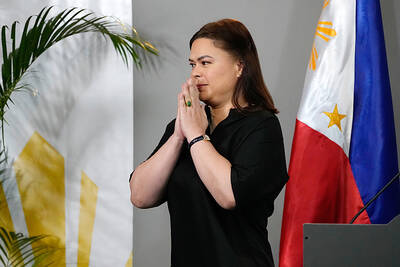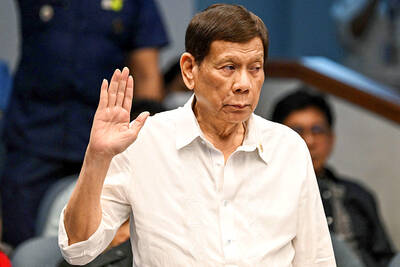Firearms owners in the Philippines are fighting efforts by the government and private groups to curb gun ownership.
A lawsuit on the right to bear arms has been filed by a prominent gun enthusiast, and groups defending the right to own guns are recruiting members to counter rival bodies seeking to restrict the number of guns in private hands.
Ironically, the campaign for the right to own guns gained strength when President Gloria Arroyo in January issued an order banning civilians from carrying their weapons outside of their homes.
The order effectively revoked hundreds of permits to carry firearms that the Interior Department had already issued to private citizens who said they needed guns for self-protection or professional reasons.
Holders of such permits had each paid as much as 7,000 pesos (US$131) in fees to get them. Arroyo's order did not offer any refund.
In an unprecedented move, the firearms rights group, Peaceful Responsible Owners of Guns (Pro-Gun), held a large rally to show its outrage.
"It was really rough for us. Some people had just been issued a permit on the same day that they came out with the order" cancelling the permits, said Pro-Gun secretary general Andy Apostol.
Pro-Gun president Mike Melchor said some 12,000 people were affected by the order.
Officials then appeared to backtrack, saying the firearms permits were only being reviewed to strengthen safeguards and weed out unqualified people.
New permits to carry firearms will be issued and those who paid for their old permits will have the balance of their fees taken into account, the department has said.
Pro-Gun argues that the crackdown on guns mainly affects the licensed owners of firearms and does nothing about the unlicensed guns in the hands of criminals, communist insurgents and Muslim separatists.
Frank Chavez, a former chief government lawyer, filed a petition with the Supreme Court to have Arroyo's order suspended on the grounds that it was unconstitutional.
Carlo Ybanez, a lawyer who helped draft Chavez's petition, conceded that Filipinos, unlike Americans, do not have the right to bear arms enshrined in their Constitution.
"But we can argue that we have the right to carry arms because it is intertwined to our rights to protect life, especially here in the Philippines where we all know that the police cannot protect the citizens," he said.
Officials said 800,000 firearms licenses had been issued this year to civilians and government officials.
Another 328,000 firearms are believed held by civilians without police authorization.
This does not include the guns in the hands of rebel groups like the communist New People's Army and the Muslim separatist Moro Islamic Liberation Front.
Many Filipinos feel they must carry guns to protect themselves, especially in rural areas where rebels and bandit gangs are active in extortion and kidnapping for ransom.
Oscar Tan, president of a grocery store owners' association in the southern city of Cotabato, said "It would be very difficult for us traders who are easy targets of kidnappings to roam around" after Arroyo's order.
However Nandy Pacheco, president of the Gun-less Society, a group advocating firearms control, says the public would be safer if fewer people were allowed to carry guns in public.
Pacheco said Filipinos often showed off their masculinity by flaunting their guns and used them even over trivial matters.
"You know the Filipinos: even just with traffic problems, there will be gunbattles," he said.
While his group is in favor of "progressive disarmament," it has not called for banning people from keeping guns in their homes and for sport.
Under existing laws, most Filipinos are allowed to own only two guns: one "long arm" -- a shotgun or a .22 caliber rifle, and one handgun.
Just getting a license for each gun requires certificates of employment, clearances from police officials, mayors and courts, drug and psychiatric tests and the payment of fees.
Even then, a license-holder can only keep guns at home. A much-valued "permit to carry" is required to transport the guns. Procuring that needs more clearances and fees.

FEROCIOUS FISH-EATER Scientists have found a new species of dinosaur from the Cretaceous Period, a ‘hell heron’ that stalked the rivers, deep in the Saharan desert At a remote Sahara desert site in Niger, scientists have unearthed fossils of a new species of Spinosaurus, among the biggest of the meat-eating dinosaurs, notable for its large blade-shaped head crest and jaws bearing interlocking teeth for snaring fish. It prowled a forested inland environment and strode into rivers to catch sizable fish like a modern-day wading bird — a “hell heron,” as one of the researchers put it, considering it was about 12 meters long and weighed 5-7 tons. The dinosaur presented a striking profile on the Cretaceous Period landscape of Africa some 95 million years ago as it hunted

‘COST OF DEFECTION’: Duterte’s announcement could be an effort to keep allies in line with the promise of a return to power amid political uncertainty, an analyst said Philippine Vice President Sara Duterte yesterday announced she would run for president of the Southeast Asian nation of 116 million in 2028. Duterte, who is embroiled in a bitter feud with Philippine President Ferdinand Marcos Jr, was impeached last year only to see the country’s Supreme Court throw the case out over procedural issues. Her announcement comes just days before her father, former Philippine president Rodrigo Duterte, begins a pretrial hearing at the International Criminal Court (ICC) in the Netherlands over crimes against humanity allegedly committed as part of a brutal crackdown on drugs. “I offer my life, my strength and my future

NOT YET THERE: While the show was impressive, it failed to demonstrate their ability to move in unstructured environments, such as a factory floor, an expert said Dancing humanoid robots on Monday took center stage during the annual China Media Group’s Spring Festival Gala, China’s most-watched official television broadcast. They lunged and backflipped (landing on their knees), they spun around and jumped. Not one fell over. The display was impressive, but if robots can now dance and perform martial arts, what else can they do? Experts have mixed opinions, with some saying the robots had limitations and that the display should be viewed through a lens of state propaganda. Developed by several Chinese robotics firms, the robots performed a range of intricate stunts, including martial arts, comedy sketches and choreographed

DRUG WAR: The former president said there was no campaign to kill addicts, but his speeches called for violence and told police to use lethal force if necessary Former Philippine president Rodrigo Duterte earned global infamy for the deadly drug crackdown that led to his arrest over crimes against humanity charges, despite his huge popularity at home. A profane-lipped populist and self-professed killer, Duterte’s anti-crime campaign resulted in the deaths of thousands of alleged dealers and addicts. Rights groups said many of those killed were poor men, often without any proof they were linked to drugs. Yet, while drawing condemnation abroad, tens of millions of Filipinos backed his swift brand of justice — even as he joked about rape in his rambling speeches, locked up his critics and failed to